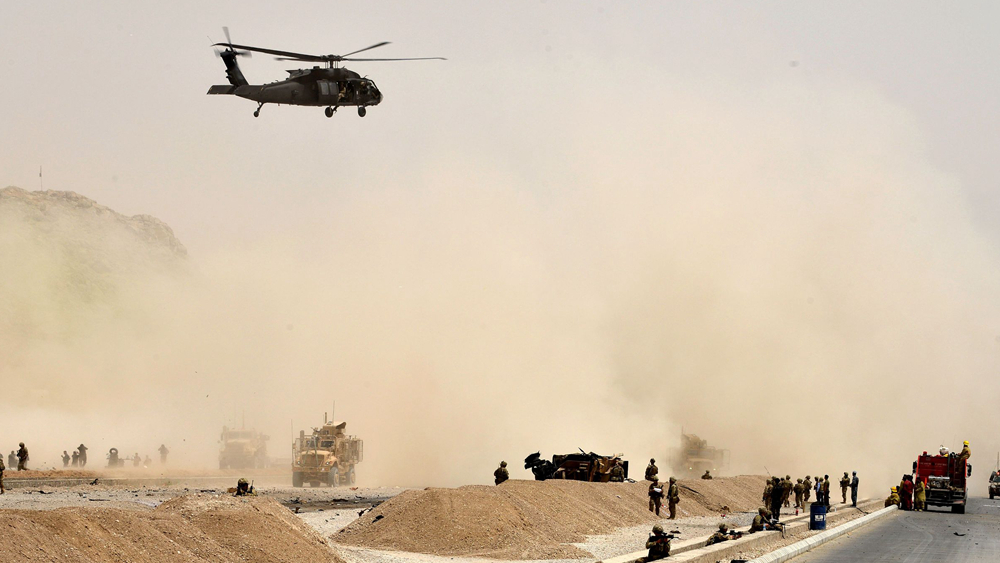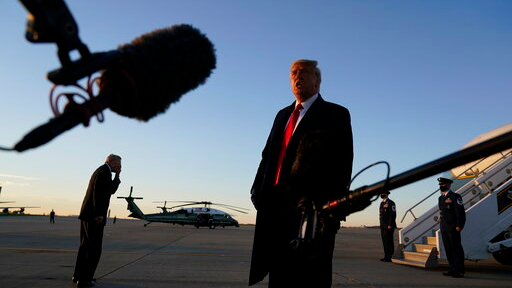
A U.S. black hawk helicopter flies over the site of a Taliban suicide attack in Kandahar, August 2, 2017. /CFP
A U.S. black hawk helicopter flies over the site of a Taliban suicide attack in Kandahar, August 2, 2017. /CFP
Editor's note: Bradley Blankenship is a Prague-based American journalist, political analyst and freelance reporter. The article reflects the author's opinions, and not necessarily the views of CGTN.
Outgoing U.S. President Donald Trump has been looking to serve up some major foreign policy changeups in the next several weeks as he refuses to accept the results of the recent presidential election and wants to leave a lasting legacy, perhaps even shape the policy of his successor. This is one of the areas that Trump, the commander-in-chief of the military and head of state, can certainly exert influence.
Shockwaves were sent through Washington when the Trump administration announced it will pull back about 2,000 troops from Afghanistan and 500 from Iraq, which is definitely good news but not as good as the initial speculation that there might be a total withdrawal from these countries by the administration before exiting. It was always unlikely, however.
In the particular case of America's longest-running conflict, Afghanistan, it's widely believed in liberal or left-wing media spaces that the U.S. has no viable objective and is there to simply profit military contractors, but this isn't true. Sure, there's no doubt that military contractors profit immensely from endless wars that present a perfect opportunity to show off flashy new weapons to peddle to American allies, but there are actually concrete military objectives.
Acting Secretary of Defense Christopher Miller actually alluded to these objectives in his announcement of the troop pullback. According to him, the pullback "does not equate change" to outstanding U.S. policies and objectives.
So what are these policies and objectives, and why is the U.S. really still in Afghanistan?
To find the answer to this question, one doesn't have to look any further than the State Department. Colonel Lawrence Wilkerson, former Secretary of State Colin Powell's chief of staff, articulated these reasons succinctly during a speech at the Ron Paul Institute's 2018 Washington conference.
First, he said, the U.S. has a troop presence in Afghanistan to disrupt China's Belt and Road Initiative (BRI). "If we had to impact that with military power, we're in a position to do so in Afghanistan," Wilkerson said.
Second, the U.S. has an interest in potentially leaping on Pakistan's nuclear stockpile, which U.S. analysts see as the most unstable stockpile in the world. They believe that Pakistan's nuclear arms could fall into the hands of terrorists and usher in the age of nuclear terror.
It should be noted here that this objective does not actually necessitate a U.S. presence and would probably be better dealt with through international bodies under the mantle of international law.
Third, the U.S. military needs to be stationed in Afghanistan so that the U.S. Central Intelligence Agency (CIA) could launch operations in China's Xinjiang Uyghur Autonomous Region. According to Wilkerson, the U.S. sees exploiting ethnic tensions amongst Uyghurs in Xinjiang as an effective way to destabilize China.

U.S. President Donald Trump speaks to the media at a campaign rally at Pittsburgh-Butler Regional Airport in Butler, Pennsylvania, U.S., October 31, 2020. /AP
U.S. President Donald Trump speaks to the media at a campaign rally at Pittsburgh-Butler Regional Airport in Butler, Pennsylvania, U.S., October 31, 2020. /AP
Looking at two of these objectives, we see that neither of them actually fall outside the Trump administration's policies toward China. They have sought to undermine the BRI and hamper all the sorts of Chinese infrastructure projects wherever they can.
Perhaps more blatantly than any other modern administration, the Trump administration has also heavily interfered in China's internal affairs, be it in Hong Kong or Xinjiang. In fact, on this particular issue, so ubiquitous is the intelligence-agency-pushed misinformation that it's now universally accepted amongst Trump's political opponents – even by some of his most sophisticated ones.
All of this is to say with some certainty that Trump probably never actually sought a hasty withdrawal from Afghanistan without first finding an alternative for this key asset in running interference against China. This is where most of the military leadership's opposition to a full withdrawal has stemmed from – because finding an alternative will probably be impossible.
To the president's credit, the Trump-brokered U.S.-Taliban peace deal was a true milestone in advancing peace in Afghanistan, and he did a lot to break down the war narrative surrounding the conflict.
He first brought forth an economic argument that appealed to his base, calling the war costly and ineffective. He popularized the idea of negotiations with the enemy on several occasions, breaking with a long-standing attitude in Washington that such behavior is treacherous. Finally, he publicly criticized military leadership, which is unheard of by a U.S. president.
All of this said, the administration of president-elect Joe Biden is inheriting a positive situation, but one that is by no means complete.
The Taliban hopes to see Biden respect the deal that's already been agreed on, which he's poised to, but it still leaves the question about the U.S. real objectives in Afghanistan. And it's clear when looking at these that in order for the U.S. to see its way out of Afghanistan, it has to first see its way out of China's affairs, and hopefully, Biden will also commit to doing just that.
(If you want to contribute and have specific expertise, please contact us at opinions@cgtn.com.)

